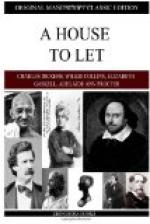The woman came in first, with the man she called Benjamin at her heels, and set the candle on the mantel-piece. Trottle takes leave to describe her as an offensively-cheerful old woman, awfully lean and wiry, and sharp all over, at eyes, nose, and chin—devilishly brisk, smiling, and restless, with a dirty false front and a dirty black cap, and short fidgetty arms, and long hooked finger-nails—an unnaturally lusty old woman, who walked with a spring in her wicked old feet, and spoke with a smirk on her wicked old face—the sort of old woman (as Trottle thinks) who ought to have lived in the dark ages, and been ducked in a horse-pond, instead of flourishing in the nineteenth century, and taking charge of a Christian house.
“You’ll please to excuse my son, Benjamin, won’t you, sir?” says this witch without a broomstick, pointing to the man behind her, propped against the bare wall of the dining-room, exactly as he had been propped against the bare wall of the passage. “He’s got his inside dreadful bad again, has my son Benjamin. And he won’t go to bed, and he will follow me about the house, up-stairs and downstairs, and in my lady’s chamber, as the song says, you know. It’s his indisgestion, poor dear, that sours his temper and makes him so agravating—and indisgestion is a wearing thing to the best of us, ain’t it, sir?”
“Ain’t it, sir?” chimes in agravating Benjamin, winking at the candle-light like an owl at the sunshine.
Trottle examined the man curiously, while his horrid old mother was speaking of him. He found “My son Benjamin” to be little and lean, and buttoned-up slovenly in a frowsy old great-coat that fell down to his ragged carpet-slippers. His eyes were very watery, his cheeks very pale, and his lips very red. His breathing was so uncommonly loud, that it sounded almost like a snore. His head rolled helplessly in the monstrous big collar of his great-coat; and his limp, lazy hands pottered about the wall on either side of him, as if they were groping for a imaginary bottle. In plain English, the complaint of “My son Benjamin” was drunkenness, of the stupid, pig-headed, sottish kind. Drawing this conclusion easily enough, after a moment’s observation of the man, Trottle found himself, nevertheless, keeping his eyes fixed much longer than was necessary on the ugly drunken face rolling about in the monstrous big coat collar, and looking at it with a curiosity that he could hardly account for at first. Was there something familiar to him in the man’s features? He turned away from them for an instant, and then turned back to him again. After that second look, the notion forced itself into his mind, that he had certainly seen a face somewhere, of which that sot’s face appeared like a kind of slovenly copy. “Where?” thinks he to himself, “where did I last see the man whom this agravating Benjamin, here, so very strongly reminds me of?”




